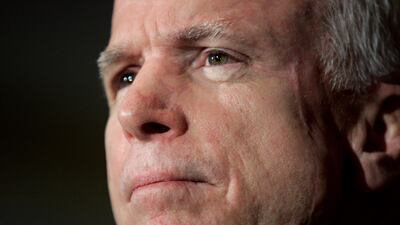The death of John McCain has robbed the Republican party of a man who embodied and fought for its traditional conservative values.
The next few months will tell whether anybody will build on McCain’s legacy or whether they have been swept away by the wave of populism under the presidency of Donald Trump.
Even in death, the visceral feud between the late senator and the president has shown no sign of abating.
According to reports in Washington, McCain asked that Mr Trump not attend his funeral. It is expected that the orations will be delivered by Barack Obama and George W Bush and the administration represented by Vice President Mike Pence.
It is telling that McCain fought against the former for the presidency and the latter for the Republican nomination. Yet despite being defeated by both men he bore no rancour.
The same cannot be said about McCain’s feelings towards Mr Trump, the man who mocked the five and a half years he spent as a prisoner of war in North Vietnam.
In an extraordinary outburst during his campaign, Mr Trump ridiculed those who regarded McCain as a hero. The billionaire reality TV host turned presidential candidate said he preferred heroes who were not captured.
It was a tasteless crack which set the tone for the remaining years of McCain’s life.
His distaste for Mr Trump and his supporters was never far from the surface. He ridiculed what he described as “half-baked nationalism cooked up by some people who would rather find scapegoats than solve problems”.
The legacy of ill-feeling has been pretty apparent as the US prepares to bid farewell to a man whose principles never wavered.
While Mr Trump dashed off a tweet to McCain’s family, Barack Obama issued a lengthy heartfelt statement.
Kelli Ward, a Trump supporter who is running for the Senate, accused McCain of stopping his cancer treatment because he wanted to hurt her campaign.
Her crass Facebook posting underlines the difference between the dog-whistle right of the Republican party and the rather more thoughtful mainstream wing epitomised by McCain, a conservative who was widely respected by liberals.
Perhaps the most telling tribute came from Victoria Reggie Kennedy, Ted Kennedy’s widow, as she recalled the close friendship her late husband and McCain enjoyed despite their political differences.
She recalled a hearing of the Armed Services Committee on torture. Kennedy, who had been questioning a witness, used up his allotted time. McCain, whose turn was next, just picked up the Massachusetts senator’s notes and carried on the interrogation seamlessly.
It was the sort of incident which led to McCain being widely respected by all sides in the Senate, where he was serving his fifth term.
McCain's main sphere of interest was foreign and military affairs, and he exercised his influence as chairman of the Senate Armed Services Committee.
Even though it could be argued that Mr McCain moved towards the centre on domestic issues, he remained a hawk when it came to diplomacy.
He had strong views on the Middle East, including support for the Arab uprisings; the Cedar Revolution in Lebanon, rounding on Iran and Syrian interference in the country; and an uncompromising backer of Israel while also supporting a two-state solution.
_______________
Read more:
John McCain and the Middle East: A staunch critic of Iran
US war hero and senator John McCain dies at 81
Editorial: John McCain fought for the land of the free
There is populist posturing – and then there are those who take responsibility
_______________
McCain’s hawkish position on Iran chimed in with the approach taken by the Mr Trump, who scrapped the nuclear deal. On this issue at least, he was prepared to support the president.
But that was a rare exception. By and large, McCain deplored the “America First” isolationism of the Trump administration.
There will be no shortage of hawks ready to support McCain’s agenda on foreign affairs and it is reasonable to expect his close friend, South Carolina’s Republican Senator Lindsey Graham, to pick up the baton.
But when it comes to becoming the voice of the Republican mainstream, the picture is less certain given the wave of “Trumpista” victories in the mid-term Republican primaries.
The party is being remade in Mr Trump's image with more than 40 Republican members of the House of Representatives standing down. In the Senate, Jeff Flake, McCain's fellow Arizona Republican senator, has quit.
"This is the president's party right now," Mr Flake, another Trump critic, said.
As things stand, the populist right has the ascendancy in the battle for the heart and soul of the Republican party. And although mainstream Republicans - those dismissed by their opponents as “Republicans in name only” - may have lost their standard bearer, the battle continues.


